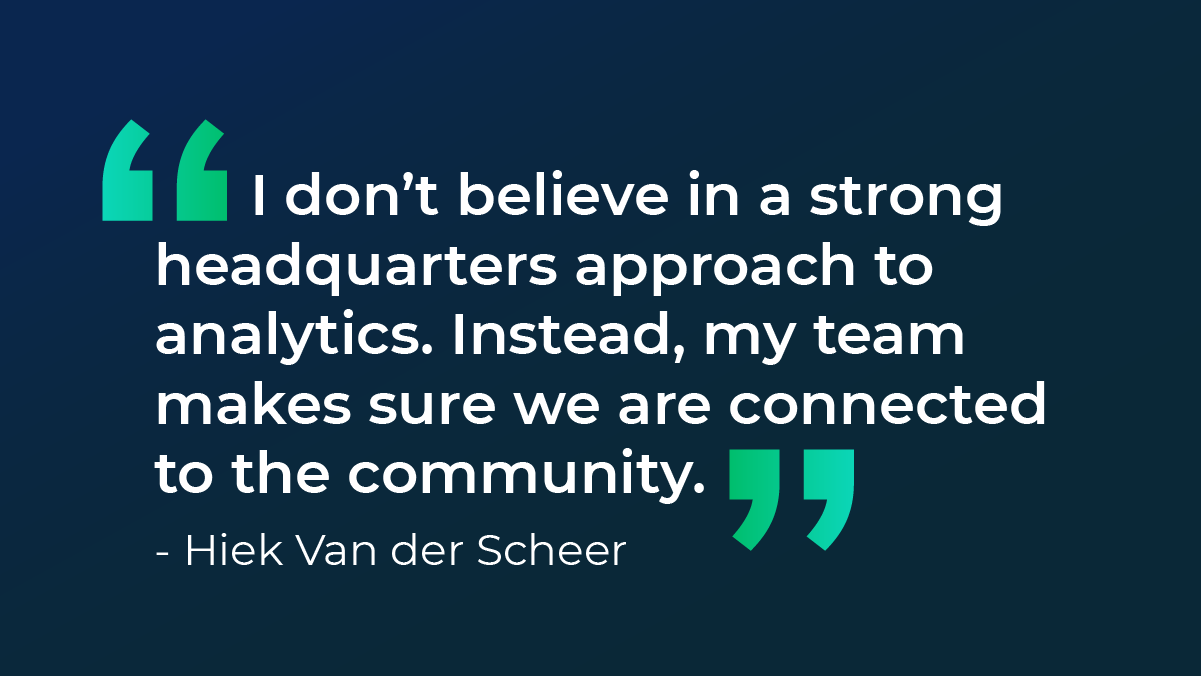10 Insights from Hiek Van der Scheer, Chief Data and Analytics Officer at Aegon

Effective use of data and analytics is essential to success in today’s marketplace. But building a cohesive organizational approach to data is a serious challenge, especially in highly regulated industries.
Hiek Van der Scheer, Chief Data and Analytics Officer at Aegon, recently shared his experiences in an insightful conversation with Anand Chopra-McGowan, General Manager for Enterprise (Europe) at Emeritus. During the discussion, they explored tips for building a data-first culture, the skills data leaders need to succeed, and more.
1. Focus on Use Cases While Developing Data Governance
Data leaders who are new to organizations may feel pressure to develop an overarching data model immediately. But Van der Scheer warns against taking on too much, too fast. Instead, he recommends that leaders first identify organizations’ key data pain points and missed opportunities and choose one use case as an entry point.
“Focusing on specific use cases shrinks the problem,” he said. “Solve these issues end-to-end, and you’ll learn about broader issues across the organization, like data ownership and quality. Go through the whole value chain to solve one use case, and you’ll both learn a lot about the challenges and add value. When you go to the next problem, you can use that information.”
2. Maintain Global Control of Data
In a highly regulated industry like insurance, a mistake made at the local level (for example, a violation of the European GDPR data privacy law) can impact the company’s revenue at the global level. Therefore, Van der Scheer said, an organization’s central operating team should manage and oversee the company’s data, even when it is coming from local offices. With that global oversight, data leaders can ensure all the information they’re using is clean, accessible, and used to its full potential.
3. Leverage Local Leadership of Analytics
Analytics, on the other hand, is better managed at the local level due to the intricacies of local regulations and privacy laws, as well as local teams’ superior knowledge of their markets’ demands and operating language.
“I don’t believe in a strong headquarters approach to analytics. Instead, my team makes sure we are connected to the community,” said Van der Scheer, who oversees analytics groups in 20 countries. “My role is creating that community for analytical folks to ensure that we aren’t reinventing the wheel but are accelerating our analytics transformation.”
4. Look at Regulation as an Opportunity, Not a Burden
While leaders often focus on the limitations data management regulations pose, Van der Scheer argues that they also present new opportunities for data leaders.
“Regulation has accelerated some data work for us,” he said. “For example, GDPR forced us to develop a much better view on our data and accelerated some of the privacy-by-design elements.”
While keeping up with changing regulations can be a challenge, they often provide a clear business case for the data team’s data evolution efforts.
5. Give Employees Data Tools to Develop Comfort and Buy-In
One of the key roles of a data leader, Van der Scheer says, is to build a data-driven culture within their organization. To start, he recommends providing access to simple dashboards to develop a baseline familiarity with data. Once they develop that familiarity, employees learn to ask data-driven questions to raise red flags when something seems wrong and even to predict when issues might arise. Ultimately, your workforce will become comfortable using models to suggest the best courses of action.

6. Use the Momentum of COVID-19 to Your Advantage
The shift toward remote work started by COVID-19 also presents certain opportunities for data leaders. This is because it’s forced workers to become more open to international collaboration and the use of digital tools. During the pandemic, people had no choice but to start using systems that they had previously resisted.
“Once you get into the new routine and understand it works, it accelerates,” Van der Scheer said. Savvy leaders will continue to build on that momentum and take advantage of increasing comfort with a digital-first approach.
7. Build in Feedback Loops
Traditionally, it’s been difficult for data leaders to track whether company intermediaries (like sales teams) use the data recommendations they receive in their on-the-ground work. During the pandemic, Van der Scheer’s team implemented a new approach in which sales employees call the end customer from within the system that provides data. This allows them to track call volumes and identify whether using their data models led to additional sales or cross-sales.
“Before, the feedback loop was often very difficult because intermediaries do not want to have the burden of additional tracking,” he said. “This helps us improve our models to improve recommendations, and also allows us to show our intermediaries who were resistant that the tool works.”
8. Keep Ethical Considerations Front of Mind
As companies develop new AI and machine learning systems, it’s essential to develop a robust ethical framework to help evaluate new activities. At Aegon, Van der Scheer is building a multidisciplinary ethics team that looks at use cases from multiple different angles to identify how data can be used or misused and to develop protections.
For example, Aegon has ensured that when AI makes decisions that affect customers, a human review or appeals process is always in place.
9. Develop Essential Hard and Soft Skills
According to Van der Scheer, data leaders need a mix of hard and soft skills to succeed in their roles. Key soft skills include critical thinking skills, like the ability to identify areas poised for disruption and the flexibility to accept change and adapt quickly.
In terms of technical skills, Van der Scheer recommends developing a “T-shaped profile.” Leaders need to have a broad understanding of everything from data applications to regulatory concerns to make mission-critical decisions, but it’s not possible to specialize in everything. However, leaders should have deep expertise in at least a couple of areas—for instance, advanced analytics or AI—to add value.
10. Demonstrate a Clear Vision for Adding Value
“Be bold in your conviction about what needs to happen for the organization,” Van der Scheer advised. “You need to have a vision of how data and analytics can change your organization.”
With that clear vision in place, leaders can identify the areas in which data and analytics can move the needle rather than simply pursuing data or analytics for the sake of it. The most beautiful models, Van der Scheer said, have no value if they are never actually implemented.
View a recording of the conversation with Hiek Van der Scheer here.
Are you working to develop effective data and analytics capabilities within your company? Browse our selection of data science courses, or schedule a meeting with Emeritus Enterprise can help you identify needs and develop a plan to educate your employees.





